In Long-Awaited Victory, High Court Vacates Alabama Decision Allowing Public School Prayer
FOR IMMEDIATE RELEASE
MONTGOMERY, AL — The American Civil Liberties Union today welcomed a Supreme Court order essentially reversing a ruling that let public school students in an Alabama county lead group prayers at graduations, assemblies and sports events.
The Justices told a federal appeals court to restudy Chandler v. Siegelman, a 1996 case, in light of a major school-prayer decision they announced last week in a Texas case. In that ruling, the court said prayer in public schools must be private and that such prayers at high school football games violate the constitutionally required separation of church and state.
“This is a victory for our clients Michael and Jesse Chandler and also a tremendous victory for the Constitution,” said ACLU cooperating attorney Elizabeth Hubertz, one of the Chandler family’s lawyers. “Our only regret is that this predictable result, consistent with 40 years of Constitutional law, did not come sooner.”
After the Justices barred clergy-led prayers at public school graduation ceremonies in 1992, Alabama legislators enacted a law requiring public schools to allow student-initiated prayer at “compulsory or non-compulsory” school activities including sporting events, student assemblies and graduations.
In 1996, acting on behalf of Michael Chandler and his son, Jesse, the ACLU of Alabama challenged the law and its enforcement in DeKalb County public schools.
In legal papers, the ACLU said, Jesse’s school let students lead Christian prayers in classrooms and over the intercom, and allowed students or clergy to lead prayers at graduations, football games and student assemblies. Gideon Bibles were handed out in classrooms by non-school personnel.
Judge Ira DeMent entered an injunction prohibiting these practices but explicitly recognizing students’ rights to pray individually or in small groups, to pray and proselytize during lunch, recess, before and after school, and during other free time, to distribute religious literature, and to express their religious beliefs in artwork, homework, and other academically appropriate contexts.
The Eleventh Circuit then set aside portions of Judge DeMent’s injunction, holding that prayer over the intercom owned by the school board was “private” speech if anyone other than a school board employee delivered it.
The Supreme Court explicitly rejected that position last week, focusing on the governmental sponsorship of religion that occurs when the public schools allow their intercoms to be used for prayer before an audience that is either made to be there such as in a classroom, or is only there because the school event draws them, such as football games.
In the appeal acted on Monday, the ACLU said, schools cannot “engage unwilling students in religious activity as part of school-controlled events.”
“Truly private prayer neither seeks nor requires a microphone and an audience,” the appeal said.
“It will now be the duty of the Eleventh Circuit not to reinstate its previous opinion and to follow the law as the Supreme Court just announced it,” said ACLU of Alabama cooperating attorney Pamela Sumners. “Today’s ruling could not be made more clear.”
Since the Eleventh Circuit decision has been vacated, Judge DeMent’s injunction remains in full force and effect, Sumners noted. It forbids school-sponsored prayer and other coercive religious practices regardless of who the speaker is, and focuses on the use of state facilities to promote religion and also on the coercive settings of classrooms and school events.
The case is Chandler vs. Siegelman, 99-935.
Stay Informed
Every month, you'll receive regular roundups of the most important civil rights and civil liberties developments. Remember: a well-informed citizenry is the best defense against tyranny.




